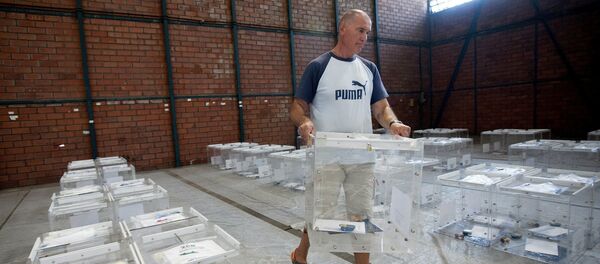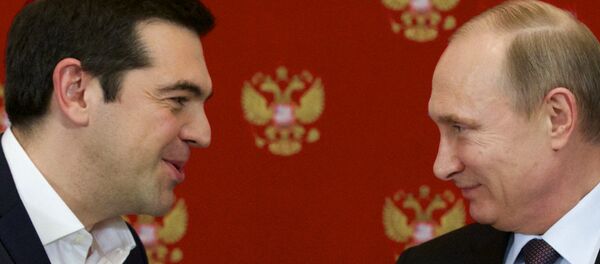The second snap parliamentary elections in Greece in 2015 started on Sunday, expected to result in a government led by one of the two main rivals, the left-wing Syriza or the right-wing New Democracy party.
The vote is held from 7 a.m. local time (4:00 GMT) until 7 p.m., with 19 thousand ballot stations opened across the country. According to the Greek Interior Ministry, over 9.8 million people are expected to cast their ballot on Sunday.
The first official exit polls will be published at 7 p.m. local time and the first official estimates are expected to be known at 9 p.m.
About 400 accredited journalists, including 150 foreign reporters cover the vote.
Main Rivals
The main rivals are the same as in the January 25 elections: Syriza, the Coalition of the Radical Left headed by the former Prime Minister Alexis Tsipras, and the conservative New Democracy party, led by Evangelos Meimarakis.
But as their pre-electoral arguments both Tsipras and Meimarakis stressed they wanted to continue negotiations with Greece’s EU partners concerning the terms of the bailout and as the reasons to vote in favor of the bailout package were different, they will continue their strife.
Tsipras has repeatedly said that he was blackmailed by his European partners, and blamed the German Finance Minister Wolfgang Schaeuble for promoting the Grexit scenario unless Tsipras accepted the Memorandum of Understanding proposed by the country’s creditors.
Tsipras explained in his pre-election speech on Friday why he was in favor of the third bailout, saying that Greece is an "inseparable part of Europe" and that it "does not choose just to stay in Europe as a visitor."
At the same time, the former Greek Prime minister said he would continue his struggle "against catastrophic austerity and for regaining the values of solidarity in Europe."
The implementation of the third Memorandum is the main strategic aim of the New Democracy, but in Mondays’ broadcasted debates the party’s leader Meimarakis stressed that he wanted to initiate further negotiations with the country’s European partners concerning the taxation of Greek farmers.
Result Expectations
The Syriza and the New Democracy parties have been running neck-and-neck over the last two weeks, according to various national and local opinion polls.
According to the last polls, published on Friday, all voters agree that Syriza will win the elections. Experts expect the margin to vary from 0.5 to 3 percent.
At the same time, CEO of MRB pollster Dimitris Mavros told Sputnik that overall public fury with political powers in Greece makes it impossible to predict the results of the upcoming elections, especially as there are still about 10 percent of citizens who remain undecided.
Possible Coalition
To form the majority government one of the parties must have enough votes to receive 151 seats in the Parliament.
According to the Greek electoral law, the first party in the elections gets a premium of 50 seats in the Parliament, which means that whoever wins, will have the possibility to create parliamentary majority with individual members of parliament, if they exit their parties upon entering the Parliament, or with smaller parties, except for the main opposition party.
If ANEL fails to enter the parliament, Syriza could address two other smaller parties – PASOK and Potami – to create a coalition.
A coalition between Tsipras and former Energy minister Panagiotis Lafazanis, the leader of the Popular unity party (LAE), created in the end of August by 25 lawmakers who broke away from Syriza party, is unlikely. Both sides have numerously stressed they rule out the possibility due to discrepancy in their views on the third bailout.
The New Democracy party has said that it is open to negotiations with any party in the Greek Parliament, including Syriza, in case they win the elections, but need to form a coalition.
The elections of a new legislature were called in Greece after Tsipras resigned from the post of prime minister in August while the opposition failed to form a new government in the country.






